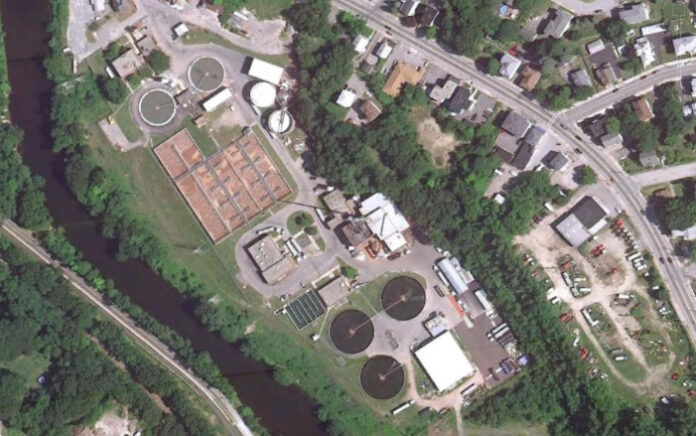
PROVIDENCE – The city of Woonsocket and the two private contractors that operate the city’s wastewater treatment plant will be taken to court by the state’s attorney general’s office and the R.I. Department of Environmental Management over alleged improper partial wastewater discharges into the Blackstone River by the plant.
R.I. Attorney General Peter F. Neronha, along with RIDEM Director Terry Gray announced Wednesday that his office filed a formal complaint with Providence County Superior Court against the city, Dallas-based Jacobs Engineering Group Inc. and Synagro Woonsocket LLC – also known as Synagro Technologies – allege that partially treated sewage has leaked into the river.
Neronha said the Woonsocket city-owned plant treats wastewater within Woonsocket, North Smithfield, and across the Massachusetts border in the towns of Blackstone and Bellingham. The river flows 48 miles from Worcester, Mass., into Pawtucket and down to Narragansett Bay.
The leaks, Neronha said at a press event at his office, violates the plant’s clean water act operating permit issued by RIDEM, as well as the state’s Clean Water Act, Freshwater Wetlands Act and state Environmental Rights Act. Neronha said Wednesday in his complaint that the city, Jacobs and Synagro have “not compelled” to properly address and permanently fix the leakage issues at the plant and into the Blackstone River despite numerous letters and interventions by RIDEM to solve the problem.
RIDEM, Neronha alleges, has attempted to work with the city and two contractors on fixing the plant’s leakage problems for more than a year, but now feel that taking legal action against the involved parties is necessary. Gray said RIDEM inspected the plant 36 times between February 2022 and Wednesday.
“They’ve had their chances… and now we’re taking action today,” Neronha said.
Neronha emphasized the Blackstone River’s history with the state, including at one point in the 1970s where the river was labeled as one of the country’s most polluted rivers due to mill usage. Significant steps were taken over many years to restore the river, where it is now listed as a Class B fresh waterway, Neronha said, suitable for swimming other recreational activities.
With the plant’s alleged sewage leaks into the river, Neronha claims the city, Jacobs and Synagro “failed to comply” multiple times with its permit, which sets strict environmental standards before the water gets discharged into the river. Those standards include sewage being “fully treated” before being released, Neronha said.
John Marsland, president and founder, Blackstone River Watershed Council/Friends of the Blackstone, said in a statement Wednesday that the alleged illegal discharges into the river are “a slap in the face to all the community volunteers that have spent the last 30 plus years restoring our river back to a recreational gem.”
Jacobs, Neronha said, is responsible for all “sludge” generated by the plant to be delivered to appropriate holding tanks. Synagro, he said, is required to monitor the levels of sludge the plant generates.
But all parties have failed to follow those guidelines, Neronha alleges. He cited one partial sewage discharge into the river in March 2022. As a result, REDEM and the R.I. Department of Health issued a state advisory warning, which lasted four days, telling the public to not swim or eat fish caught in the river.
Neronha then claimed that four months later, additional partially treated sewage went into the river, causing another state advisory to be issued. That advisory lasted 12 days, he said. Another partial discharge took place March 1, Neronha alleges.
The state is seeking compensatory damages from the health impacts to state residents, contaminating natural resources, testing costs, attorney’s fees and other relief that the court may deem proper.
“The river deserves better than what it is getting from the city of Woonsocket, Jacobs and Synagro,” Neronha said. “[The Blackstone] is not a dumping ground anymore; it’s a resource.”
James Bessette is the PBN special projects editor, and also covers the nonprofit and education sectors. You may reach him at Bessette@PBN.com. You may also follow him on Twitter at @James_Bessette.











